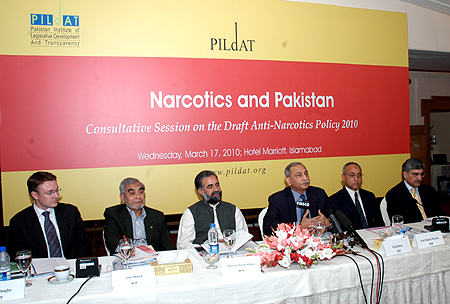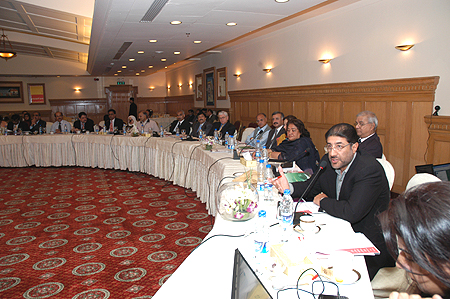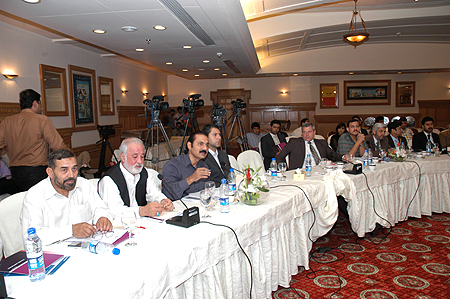|
|
| |
| EVENTS |
|
|
> PILDAT Consultative Session on Draft Anti Narcotics Policy 2010
A thorough Public Review and Effective Implementation of Anti-Narcotics Policy 2010 Stressed:
- Pakistan faces the Challenges of dismantling Narcotics/Drug Trafficking Infrastructure
- The Western World urged to stop demand of drugs
- NATO asked to eliminate Poppy Cultivation in Afghanistan
- Social Awareness, Values-based Education/Curriculum and Renaissance of Family Values encouraged
- Greater Efficiency and Coordination of Anti-Narcotics Agencies Needed alongside stricter oversight of corrupt elements
|
|
|
| |
Islamabad, March 17; In a Consultative Session on the review of the draft National Anti-Narcotics Policy 2010, Parliamentarians, representatives of drug control and rehabilitations organisations, medical experts and academics believed that a broad-based policy required wider consultation and an effective implementation strategy on the part of the Narcotics Control agencies of the country. |
|
| |
Unveiling the key features of the policy Mr. Tariq Khosa, Federal Secretary, Ministry of Narcotics Control said that the policy aimed to reduce drug supply through eliminating poppy cultivation to maintain poppy free status of the country; effectively check resurfacing of heroin laboratories, trafficking/production of narcotic drugs, psychotropic substances and precursor chemicals; enhance coordination/information sharing through structured arrangement within organizations/institutions; build the capacities of Anti-Narcotics Force; put in place enhanced efforts for forfeiting drug-generated assets and improve judicature for expeditious disposal of drug cases. On Drug Demand Prevention, the aim of the policy is to strive towards creation of drug free society in Pakistan, particularly the youth; reduce drug demand through mass awareness/education and community mobilization/active participation of people and develop a drug free city in each province as a model for others to emulate by 2012. He emphasised the aspect of enhancement of treatment and rehabilitation facilities, conducting of drug addiction survey, promotion of international cooperation in fight against drugs, etc.
|
|
| |
�I am accountable to each one of you,� said the Director General Anti Narcotics Force, Maj. Gen. Syed Shakeel Hussain while responding to the call of legislators who urged for elimination of corruption in the various agencies tasked with the job of narcotics control in the society. Parliamentarians, while praising the integrity of the Federal Secretary Narcotics Control Mr. Tariq Khosa and DG ANF Maj. Gen. Syed Shakeel Hussain, said that institutional mechanisms were required to take care of corrupt elements who lend covert support for trafficking. He said that 9/11 resulted in greater increase in production and proliferation of drugs in Pakistan. The ANF alongside other agencies is mindful of the challenge of drug trafficking through Pakistan and its causes in the society. |
|
| |
Mr. Jeremy Douglas, Resident Representative- United Nations Office on Drugs and Crime (UNODC) Pakistan said that even though Pakistan is not a major producer or consumer of drugs, its location made it attractive as a drug-trafficking route. He said that the UNODC through its other regional offices is striving for a balanced approach between supply and demand. He said that the UNODC advocates social mobilisation against the menace of drugs and crime and is willing to use all channels, as advocated in the Consultative Session, including religious and family institutions to reach the people. He said that the UNODC was preparing its own plan to match the 10 year Master plan of Pakistan Government. Responding to questions about the responsibility of UN and other agencies in Afghanistan to eliminate cultivation and supply side, he said that the UNODC country office in Afghanistan is working to monitor the production and raising the capacity of law-enforcement agencies in Afghanistan. |
|
| |
Prof. Dr. Anis Ahmad, Vice Chancellor Riphah University emphasised that without social awareness involving value-based education system and a proper use of religious institutions, consciousness can not be created to stop the spread of this menace. He highlighted the media�s role which instead of denouncing the curse of drugs played it up through the use of cigarettes, liquor and drugs in a favourable light. |
|
| |
Earlier, Mr. Ahmed Bilal Mehboob, Executive Director PILDAT, said that Narcotics Control remains a key issue in the country, especially its linkages with financing of terrorism and insurgency. There is little or no attention focussed on this crucial issue and therefore PILDAT consultative session sought to invite stakeholders� views and review of the draft Policy. He appreciated the open-ness and support of the Ministry of Narcotics Control in providing relevant information and facilitation of a dialogue. |
|
| |
Parliamentarians belonging to major political parties and constituencies around the country highlighted the issues relating to the use of drugs in the communities and the failure of law-enforcement agencies to capture big mafias and narcotic dealers. They also highlighted the need for state-of-the-art rehabilitation centres across the country, drug-free police and jail environments and the aspect of human rights and human dignity in the handling of police. MPs said they were willing to cooperate with the Ministry and the ANF to make their constituencies drug-free. They recommended the use of subsidies and incentives to farmers engaged in poppy cultivation to grow other crops matching in cash value to the farmers as part of the policy. |
|
| |
Participants believed that the international community needed to support Pakistan to close its borders. They emphasised greater coordination between countries including Iran and Afghanistan alongside Pakistan. Other relating aspects such as money laundering also need to be closely coordinated with, they believed. Specific recommendations included treatment guidelines, gender-balance and humane approach, registration and monitoring of treatment centres, etc. |
|
| |
To participation in these consultations, please email your contact details at info@pildat.org |
|
| |
|
|
| |

|
|
| |
|
|
| |

|
|
| |
|
|
| |

|
|
|
|
|
|
|
|
|